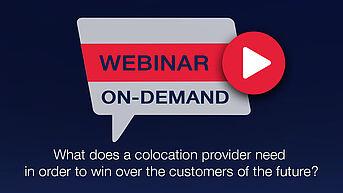What does a colocation provider need in order to win over the customers of the future?
Very many companies in Germany are now turning to colocation solutions and demand is increasing. According to the German information and telecommunications industry association, more than 10,000 companies are already using colocation services. According to Bitkom, colocation facilities will account for an impressive 50 percent of data center capacities by 2025.
Colocation service providers want to create ideal conditions that optimize IT outsourcing for their customers. This means that they face a whole range of challenges in the fields of cabling, services and IT security. In the live webtalk “What does a colocation provider need in order to win over the customer?”, Rosenberger OSI presents the right solutions to bring greater flexibility, service quality and IT security.
- Savings in costs plus reduced space requirements through scalable cabling
- Providing services for trouble-free, flexible colocation operation
- Successful, problem-free relocation to a colocation data center
- What the KRITIS regulation means for colocation service providers in practice
Now also available for consultation as a Webinar on Demand.
You can find a selection of the topics addressed and important questions and answers in the blog article.



